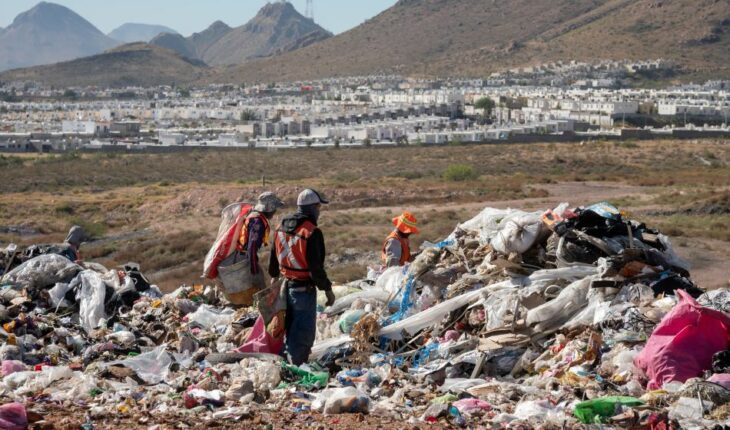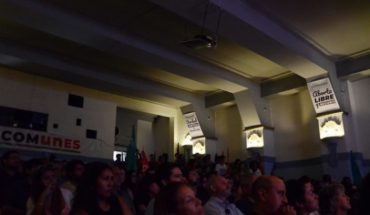At 5:45 in the morning, Marisol Mendoza leaves her house on her motorcycle. He drives through overgrown land and crosses a stream to reach the landfill where he has been working for four years.
In Mexico, there are thousands of garbage collectors, who make a living sorting and selling waste from landfills in the open. Mendoza is not one of them. She has a monthly salary, fixed hours, medical care, paid vacations, regular breaks, and access to protective equipment. Since 2016, San Lorenzo Cacaotepec, a town of about 13,000 inhabitants in the state of Oaxaca, has offered mendoza and 16 other people formal employment at the local landfill, where they are known as recyclers, not pickers.
San Lorenzo Cacaotepec formalized this type of work in 2016, and is probably the only Mexican municipality to have done so, but others may soon follow suit. In 2021, Oaxaca authorities developed a program to encourage other municipalities to emulate the successful system. “Our purpose is to invite the rest of the municipalities to see that this is possible, that it was done by a community without having resources from the branches … where sources of employment have been generated and where an interesting economic activity has also been generated,” says Helena Iturribarría, secretary of the Environment, Energy and Sustainable Development of the state.
The recyclables that Mendoza and his colleagues collect at the landfill generate between 11,000 and 13,000 pesos a month for San Lorenzo Cacaotepec. Recycling work has also extended the life of the landfill. The space was expected to reach its maximum capacity in 2016, seven years after its construction. While it will have to be expanded soon, the landfill is still in operation six years later.
“If they did not classify the garbage, there would not be a contribution for the same municipality,” says Perla Procopio, a biologist at the San Lorenzo Health and Ecology Department. “If they weren’t there, we’d be flooded with trash.”
Improvements to the landfill have ensured the safety of Mendoza and his colleagues. “Before I started working on the landfill, there were no roofs,” he says. “Now it is; the area where we separate the garbage is roofed… and that helps us to be better.”
His partner, Salvador Martínez, who has worked at the landfill for a year and a half, agrees: “Despite being a high-risk job, I feel more secure with the safety equipment we use.” The head of operations, Pedro Díaz, who started as a recycler, finds his fixed schedule appropriate, from 6 in the morning to 2 in the afternoon, because it allows him “enough time to take care of the trees on my land and be at home with my family.”
The initiative in San Lorenzo Cacaotepec was conceived by Sikanda, a renowned non-profit organization that develops recycling projects with social inclusion in Oaxaca. Founded in 2009, Sikanda has trained more than 200 people in recycling and composting techniques. It also builds recycling centers: it donated a plastic shredder and transport vehicles to the San Lorenzo Cacaotepec landfill, where it has also installed an orchard, a chicken coop and a compost area to avoid contamination of subsoils, rivers and the atmosphere.
Read: Don’t know where to take your PET containers to be recycled? Here we tell you
“We seek to have their work recognized, receive salaries with fixed hours, with social security, and directly meet their specific needs,” explains José Carlos León, founder of Sikanda.
Most of Mexico’s 2,471 municipalities do not include garbage separation in their waste management strategy. Landfills are usually open and recycling is an informal activity. “In these (places) a garbage market develops where there are people who physically live in the place and keep what they can process,” says Johannes Cabannes, a professor at the National Autonomous University of Mexico and the Ibero-American University, and an expert in municipal policies.
“They collect the garbage they know they can sell to middlemen or companies that recycle certain materials and live from those sales in a situation of high marginalization.”
Cabannes says that a pepenadora person can earn between 600 and one thousand 200 pesos a week.
There is no official data on the number of recyclers in Mexico, nor on how much money their activities generate. In a 2007 study led by the International Finance Corporation, a sister organization of the World Bank, researcher Martin Medina estimated that, at the time, the number of waste pickers in Mexico was around 100,000, of which 25% were minors.
One Mexico’s 2020 report by Mexico’s Ministry of Environment and Natural Resources (Semarnat) notes that there are waste pickers at all final disposal sites in the country. “They are not recognized and they are not remunerated, with salary or rights, for their great work,” says León.
The municipalities change administration every three years, which makes it difficult for initiatives to replicate the San Lorenzo Cacaotepec program. “It is of little or no use that we are injecting resources in the short term if this is going to be extinguished as soon as the next administration begins again,” says Cabannes. Leon adds that Sikanda has to negotiate the objectives of his project with each new government. “When we encounter apathetic administrations, the project stops working as it should,” he says.
Meanwhile, Diaz and Martinez say their work at the landfill has taught them the importance of recycling, starting from their own homes. “My work is a way in which I can contribute a grain for the care of the environment, at the same time that I receive income and live with my co-workers,” Mendoza concludes.
This story was originally published by Global Press Journal.
* Ena Aguilar Pelaez is a Global Press Journal reporter based in the state of Oaxaca, Mexico. Reach out to her on Twitter or via email.
What we do at Animal Político requires professional journalists, teamwork, dialogue with readers and something very important: independence. You can help us keep going. Be part of the team.
Subscribe to Animal Político, receive benefits and support free journalism.#YoSoyAnimal





